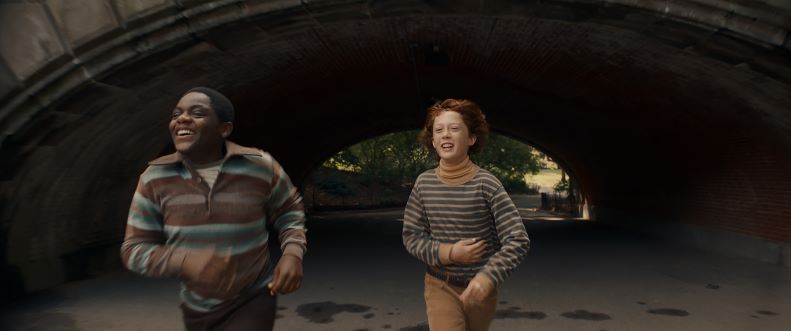Writer/director James Gray places a lot of responsibility on the slender shoulders of his young actors in this re-creation of his early 1980s upbringing. If juvenile actors have the burden of being the breadwinners, so to speak, for an entire production, then the filmmaker has an extra obligation to guide them with a steadfast hand. Here, in Gray’s semi-autobiographical film about “the strength of family, the complexity of friendship, and the generational pursuit of the American Dream,” the outcome is wobbly.
The boisterous adult actors are ready for their close-ups, and are especially well suited for any Arthur Miller examination of the American Dream set in New York City, accents and all. Yet the bulk of the narrative falls upon actor Banks Repeta as Gray’s 12-year-old alter ego, here named Paul Graff. At times, the movie feels like watching a school play at a well-funded middle school.
On the first day of school at Public School 173 in Queens, Paul’s new sixth-grade teacher, Mr. Turkeltaub (Andrew Polk), targets his derision at one Black student in particular, Johnny Davis (Jaylin Webb), who’s repeating the class again. Turkeltaub blames Johnny for bad behavior when Paul acts up behind the teacher’s back. The adult’s bias isn’t implicit, it’s blatant.
The boys bond over Apollo missions, music, and their disdain for their teacher. Not unlike a Warner Bros. film of the 1930s, one friend will have the means to succeed while the other takes a downward path. It’s 1980, and on the news, presidential candidate Ronald Reagan speculates on a doom and gloom nuclear war scenario, thus the film’s title, which is also the name of the reggae tune performed on the soundtrack by the Clash.
Later, when the boys get in trouble after they are caught smoking pot in the bathroom, their punishments result in different outcomes, once again. Paul’s mother (a very good Anne Hathaway) fiercely advocates for her son, but no one stands up for the solitary Johnny, who drops out and becomes homeless, seeking refuge in Paul’s backyard clubhouse to avoid foster care.
From the reefer incident on, Paul’s middle-class parents (including Jeremy Strong, a bit hammy, as his volatile boiler repairman dad) become anxious about their son’s public school, and they make a demand: He will attend a private prep school, whether he likes it or not. Paul turns to the only family member who he thinks could persuade his parents to change their minds, but Grandpa Aaron (Anthony Hopkins, with a perpetual twinkle in his eye) shocks him. He reveals it was his idea to change schools, that it’s an opportunity for Paul to have a leg up in life, to have doors open to him that were earlier closed to the family because they are Jewish. With his education and his non-ethnic sounding surname, Paul will go places. To put it plainly, grandpa tells him, “The game is rigged.” The result: Paul’s departure to another school ruptures a friendship. Though later on, the two friends reunite but land in trouble again, this time with the police. As in the earlier encounters with authority, their outcomes diverge.
However, their friendship is barely convincingly portrayed. The young actors often interact as though Paul and Johnny have just met. There’s a certain stiff politeness and restraint in their interactions—they act for the camera, not with each other. They are not helped by the close-ups that zero in on cryptic or hesitant performances.
Yet out of nowhere, the film springs to life when, on Paul’s first day at Forest Manor Preparatory, he meets none other than real estate mogul Fred Trump (John Diehl), a major benefactor of the school, who unctuously points the bewildered student to the assembly hall. There the speaker is none other than federal judge Maryanne Trump (Jessica Chastain, ah huh), the eldest sister to a future president, giving a pep talk to the teenagers. She sternly tells the teens that any future success they earn will be because of their own hard work and skills, and nothing else, a blatant repudiation of the concept of White privilege. (Gray went to the Kew-Forest School. Both Trumps spoke at the school.)
The film succeeds in portraying how Paul’s parents, with their blind spots and unconscious bigotry, don’t realize how they come off to their impressionable son. Mom to Paul at night: “Lock up. Your dad saw a Black boy in the alley.” However, his parents are somewhat cool and lenient. They let him join the family outing to the movies to see the R-rated Private Benjamin.
Still, when it comes to dealing with race, the movie comes across as old-fashioned, though not quite like Green Book. It has more nuance, but in retelling his formative years, Gray has nevertheless tweaked his screenplay with the trope of a White kid whose eyes are opened, and harsh lessons learned, by the trajectory and humiliation of a self-sacrificing Black character. Johnny remains a device, mainly because he’s a stand-in, a representation, and not a fleshed-out companion. Viewers learn little about his family history, with only brief moments involving his caretaker, his grandmother, who has dementia. We also don’t learn about his ultimate fate.
If the screenplay were to turn into a novelization for young adult readers, editors and sensitivity readers would have their work cut out for them.
Armageddon Time is currently screening at the New York Film Festival. It opens theatrically on October 28.







Leave A Comment